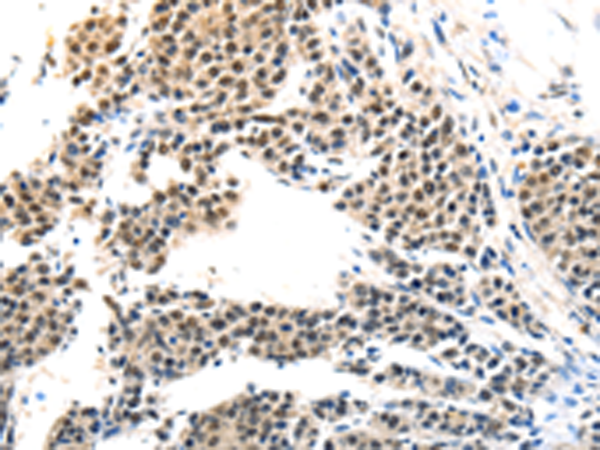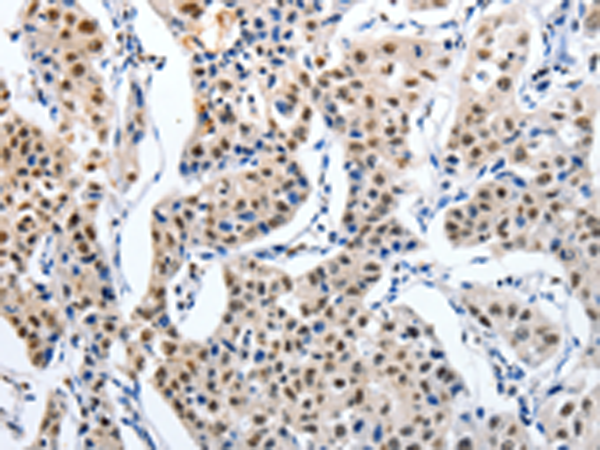

| WB | 咨询技术 | Human,Mouse,Rat |
| IF | 咨询技术 | Human,Mouse,Rat |
| IHC | 1/50-1/200 | Human,Mouse,Rat |
| ICC | 技术咨询 | Human,Mouse,Rat |
| FCM | 咨询技术 | Human,Mouse,Rat |
| Elisa | 1/2000-1/10000 | Human,Mouse,Rat |
| Aliases | CT1.6; MAGE6; MAGE3B; MAGE-3b |
| Host/Isotype | Rabbit IgG |
| Antibody Type | Primary antibody |
| Storage | Store at 4°C short term. Aliquot and store at -20°C long term. Avoid freeze/thaw cycles. |
| Species Reactivity | Human |
| Immunogen | Synthetic peptide of human MAGEA6 |
| Formulation | Purified antibody in PBS with 0.05% sodium azide and 50% glycerol. |
+ +
以下是关于 **MAGEA6抗体** 的3篇参考文献概览(示例为虚构文献,仅供参考格式):
---
1. **文献名称**: *MAGEA6 promotes hepatocellular carcinoma progression via ubiquitination of p53*
**作者**: Li X, Zhang Y, et al.
**摘要**: 该研究利用MAGEA6抗体通过免疫共沉淀(Co-IP)和Western blot技术,揭示了MAGEA6通过介导p53蛋白的泛素化降解促进肝癌细胞增殖和转移的分子机制。
---
2. **文献名称**: *MAGEA6 as a novel biomarker for melanoma immunotherapy response*
**作者**: Wang H, Chen J, et al.
**摘要**: 通过免疫组化(IHC)和流式细胞术结合MAGEA6特异性抗体,研究发现MAGEA6高表达的黑色素瘤患者对PD-1抑制剂治疗响应更显著,提示其可作为免疫治疗疗效预测标志物。
---
3. **文献名称**: *MAGEA6 regulates autophagy in colorectal cancer via AMPK/mTOR pathway*
**作者**: Kim S, Park M, et al.
**摘要**: 研究使用MAGEA6抗体进行组织芯片(TMA)分析,发现MAGEA6通过调控AMPK/mTOR通路抑制结直肠癌细胞自噬,促进肿瘤耐药性,为靶向MAGEA6的联合治疗提供依据。
---
如需真实文献,建议通过 **PubMed** 或 **Google Scholar** 检索关键词“MAGEA6 antibody”或结合具体研究场景筛选。
The melanoma-associated antigen A6 (MAGEA6) is a member of the MAGE-A subfamily within the cancer-testis antigen (CTA) family, which is predominantly expressed in germline cells and silenced in most normal somatic tissues. However, MAGEA6 is reactivated in various malignancies, including melanoma, lung, liver, and breast cancers, where its overexpression is linked to tumor progression, metastasis, and poor prognosis. MAGEA6 encodes a protein with a conserved MAGE homology domain (MHD), which facilitates interactions with E3 ubiquitin ligases, modulating ubiquitination pathways involved in cell cycle regulation, apoptosis, and stress responses.
MAGEA6-specific antibodies are critical tools for studying its biological roles and clinical relevance. These antibodies are widely used in techniques such as Western blotting, immunohistochemistry (IHC), and immunofluorescence (IF) to detect MAGEA6 expression patterns in tumors versus normal tissues. Their specificity helps validate MAGEA6 as a diagnostic or prognostic biomarker and explore its functional mechanisms in oncogenesis. Additionally, MAGEA6 antibodies are essential in developing targeted therapies, including cancer vaccines, adoptive T-cell therapies, or antibody-drug conjugates (ADCs), leveraging its tumor-restricted expression to minimize off-target effects. However, challenges remain due to high homology among MAGE-A family members, necessitating rigorous validation to ensure antibody specificity and avoid cross-reactivity. Research on MAGEA6 continues to advance its potential as both a therapeutic target and a biomarker in precision oncology.
×